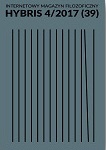POLITICAL LIBERALISM AND POLITICAL EMOTIONS – AN UNLIKELY ALLIANCE? ON MARTHA NUSSBAUM’S APPROACH TO STABILITY
POLITICAL LIBERALISM AND POLITICAL EMOTIONS – AN UNLIKELY ALLIANCE? ON MARTHA NUSSBAUM’S APPROACH TO STABILITY
Author(s): Urszula LisowskaSubject(s): Political Philosophy, Political Theory, Contemporary Philosophy
Published by: Wydawnictwo Uniwersytetu Łódzkiego
Keywords: political liberalism; emotions; stability; dignity; human good;
Summary/Abstract: The paper offers a type of internal criticism of Martha Nussbaum’s liberal political philosophy. On the one hand, Nussbaum’s claims to political liberalism (as defined by Rawls) are questioned. It is argued that her capabilities-based liberalism remains committed to a broader, primarily Aristotelian account of the human condition. As a result, it exceeds the limits imposed by political liberalism with its focus on citizenship and non-comprehensive foundations of political regimes. On the other hand, the paper argues that Nussbaum’s project can meet the basic normative objective of political liberalism. That is to say, it offers a convincing solution to the question: how can liberal values be stable in a society, given that liberalism endorses the plurality of acceptable normative doctrines? Nussbaum is able to address this issue, because her rich philosophical commitments allow her to complement liberal tenets with a compatible account of practical reasoning complementary. The paper focuses on one of the elements of this conception, i.e. Nussbaum’s theory of emotions and their role in a political culture.
Journal: Internetowy Magazyn Filozoficzny HYBRIS
- Issue Year: 2017
- Issue No: 39
- Page Range: 19-37
- Page Count: 19
- Language: English

